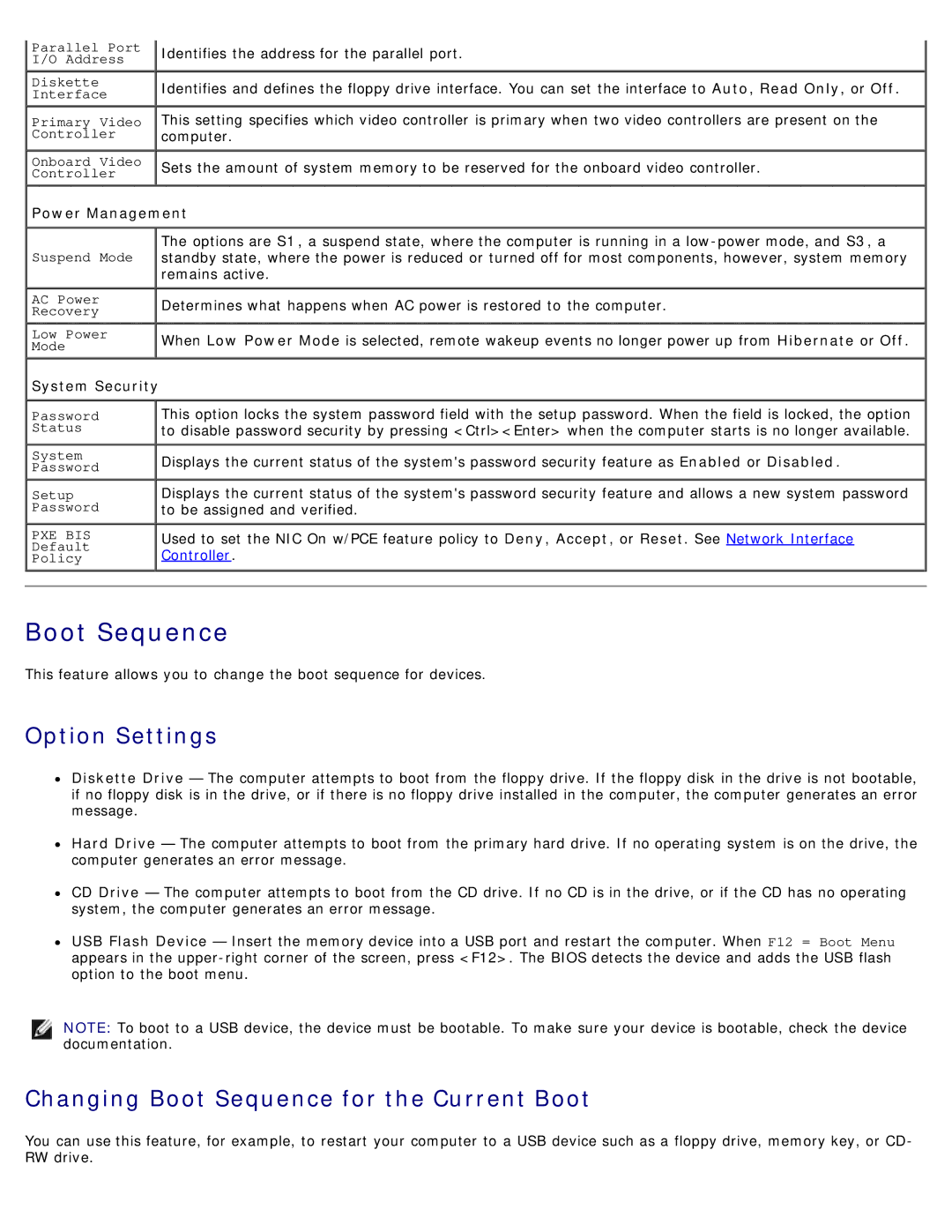
Parallel Port
I/O Address
Diskette
Interface
Identifies the address for the parallel port.
![]() Identifies and defines the floppy drive interface. You can set the interface to Auto, Read Only, or Off.
Identifies and defines the floppy drive interface. You can set the interface to Auto, Read Only, or Off.
Primary Video | This setting specifies which video controller is primary when two video controllers are present on the |
Controller | computer. |
Onboard Video | Sets the amount of system memory to be reserved for the onboard video controller. |
Controller |
|
Power Management | |
Suspend Mode | The options are S1, a suspend state, where the computer is running in a |
standby state, where the power is reduced or turned off for most components, however, system memory | |
| remains active. |
AC Power | Determines what happens when AC power is restored to the computer. |
Recovery |
|
Low Power | When Low Power Mode is selected, remote wakeup events no longer power up from Hibernate or Off. |
Mode |
|
 System Security
System Security
Password
Status
System
Password
Setup
Password
PXE BIS
Default
Policy
This option locks the system password field with the setup password. When the field is locked, the option to disable password security by pressing <Ctrl><Enter> when the computer starts is no longer available.
![]() Displays the current status of the system's password security feature as Enabled or Disabled.
Displays the current status of the system's password security feature as Enabled or Disabled.
Displays the current status of the system's password security feature and allows a new system password to be assigned and verified.
Used to set the NIC On w/PCE feature policy to Deny, Accept, or Reset. See Network Interface Controller.
Boot Sequence
This feature allows you to change the boot sequence for devices.
Option Settings
![]() Diskette Drive — The computer attempts to boot from the floppy drive. If the floppy disk in the drive is not bootable, if no floppy disk is in the drive, or if there is no floppy drive installed in the computer, the computer generates an error message.
Diskette Drive — The computer attempts to boot from the floppy drive. If the floppy disk in the drive is not bootable, if no floppy disk is in the drive, or if there is no floppy drive installed in the computer, the computer generates an error message.
![]() Hard Drive — The computer attempts to boot from the primary hard drive. If no operating system is on the drive, the computer generates an error message.
Hard Drive — The computer attempts to boot from the primary hard drive. If no operating system is on the drive, the computer generates an error message.
![]() CD Drive — The computer attempts to boot from the CD drive. If no CD is in the drive, or if the CD has no operating system, the computer generates an error message.
CD Drive — The computer attempts to boot from the CD drive. If no CD is in the drive, or if the CD has no operating system, the computer generates an error message.
![]() USB Flash Device — Insert the memory device into a USB port and restart the computer. When F12 = Boot Menu appears in the
USB Flash Device — Insert the memory device into a USB port and restart the computer. When F12 = Boot Menu appears in the
NOTE: To boot to a USB device, the device must be bootable. To make sure your device is bootable, check the device documentation.
Changing Boot Sequence for the Current Boot
You can use this feature, for example, to restart your computer to a USB device such as a floppy drive, memory key, or CD- RW drive.
